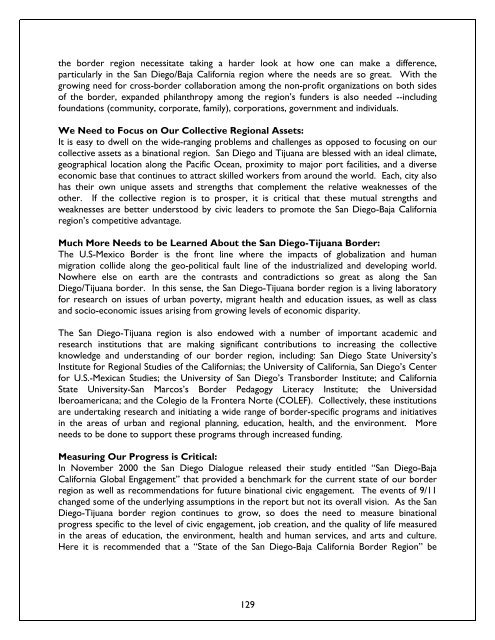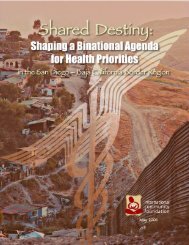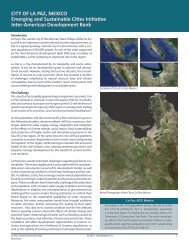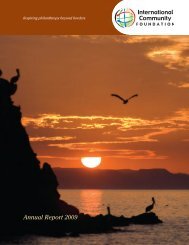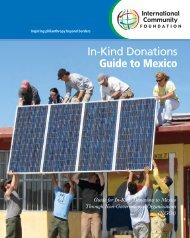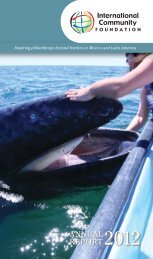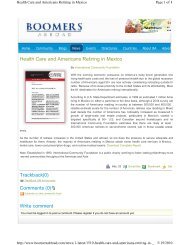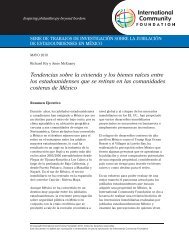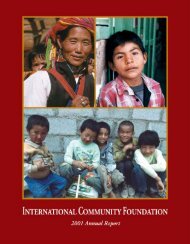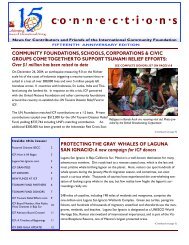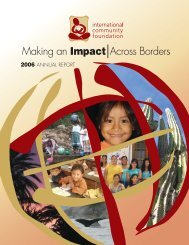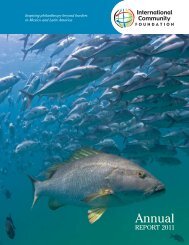Blurred Borders - International Community Foundation
Blurred Borders - International Community Foundation
Blurred Borders - International Community Foundation
Create successful ePaper yourself
Turn your PDF publications into a flip-book with our unique Google optimized e-Paper software.
the border region necessitate taking a harder look at how one can make a difference,<br />
particularly in the San Diego/Baja California region where the needs are so great. With the<br />
growing need for cross-border collaboration among the non-profit organizations on both sides<br />
of the border, expanded philanthropy among the region’s funders is also needed --including<br />
foundations (community, corporate, family), corporations, government and individuals.<br />
We Need to Focus on Our Collective Regional Assets:<br />
It is easy to dwell on the wide-ranging problems and challenges as opposed to focusing on our<br />
collective assets as a binational region. San Diego and Tijuana are blessed with an ideal climate,<br />
geographical location along the Pacific Ocean, proximity to major port facilities, and a diverse<br />
economic base that continues to attract skilled workers from around the world. Each, city also<br />
has their own unique assets and strengths that complement the relative weaknesses of the<br />
other. If the collective region is to prosper, it is critical that these mutual strengths and<br />
weaknesses are better understood by civic leaders to promote the San Diego-Baja California<br />
region’s competitive advantage.<br />
Much More Needs to be Learned About the San Diego-Tijuana Border:<br />
The U.S-Mexico Border is the front line where the impacts of globalization and human<br />
migration collide along the geo-political fault line of the industrialized and developing world.<br />
Nowhere else on earth are the contrasts and contradictions so great as along the San<br />
Diego/Tijuana border. In this sense, the San Diego-Tijuana border region is a living laboratory<br />
for research on issues of urban poverty, migrant health and education issues, as well as class<br />
and socio-economic issues arising from growing levels of economic disparity.<br />
The San Diego-Tijuana region is also endowed with a number of important academic and<br />
research institutions that are making significant contributions to increasing the collective<br />
knowledge and understanding of our border region, including: San Diego State University’s<br />
Institute for Regional Studies of the Californias; the University of California, San Diego’s Center<br />
for U.S.-Mexican Studies; the University of San Diego’s Transborder Institute; and California<br />
State University-San Marcos’s Border Pedagogy Literacy Institute; the Universidad<br />
Iberoamericana; and the Colegio de la Frontera Norte (COLEF). Collectively, these institutions<br />
are undertaking research and initiating a wide range of border-specific programs and initiatives<br />
in the areas of urban and regional planning, education, health, and the environment. More<br />
needs to be done to support these programs through increased funding.<br />
Measuring Our Progress is Critical:<br />
In November 2000 the San Diego Dialogue released their study entitled “San Diego-Baja<br />
California Global Engagement” that provided a benchmark for the current state of our border<br />
region as well as recommendations for future binational civic engagement. The events of 9/11<br />
changed some of the underlying assumptions in the report but not its overall vision. As the San<br />
Diego-Tijuana border region continues to grow, so does the need to measure binational<br />
progress specific to the level of civic engagement, job creation, and the quality of life measured<br />
in the areas of education, the environment, health and human services, and arts and culture.<br />
Here it is recommended that a “State of the San Diego-Baja California Border Region” be<br />
129


